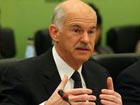| Videos | • Latest |
|
• Feature | • Sports | • Your Videos |
Greece says EU outcome a historic moment

 0 Comment(s)
0 Comment(s) Print
Print E-mail
CNTV, October 28, 2011
E-mail
CNTV, October 28, 2011
Related reading:
Europe sealed a last-ditch deal Thursday to fix its festering debt crisis, shoring up its bailout fund, pledging new funds for Greece and pushing banks to share the pain at a summit vital to the health of the global economy.
After days of talks and two successive summits that dragged on for almost 10 hours as markets and world leaders remained on tenterhooks, EU president Herman Van Rompuy emerged in the wee hours saying: "We took important decisions."
IMF chief Christine Lagarde welcomed "substantial progress," but European Central Bank chief Jean-Claude Trichet warned that "all of this now requires a lot of work and a lot of quick work."
The last and perhaps toughest chapter in the four-point plan was a deal between eurozone leaders and the Institute of International Finance banking lobby to force private investors to take a 50 percent loss on Greece's debt.
French President Nicolas Sarkozy and German Chancellor Angela Merkel broke off from the summit to save the day and cut a deal with the head of the banking lobby, Charles Dallara.
"We said it was our last word, our last offer," said Merkel of threats to allow Greece to default failing agreement.
The banks in past weeks had raised their offer to 40 percent but governments insisted on a 50-percent "haircut."
The deal aims to slice a whopping 100 billion euros off the 350-billion-euro debt pile hampering Greece, which also won new pledges of a 100-billion-euro loan over the next three years.
Prime Minister George Papandreou hailed "a new era, a new chapter" for Greece, whose debt woes kicked off a two-year crisis that successively hit Ireland and Portugal before threatening to spill over to the euro area's third and fourth economies, Italy and Spain.
To address that danger, eurozone leaders agreed to boost their debt rescue fund to one trillion euros.
The firepower of the European Financial Stability Facility (EFSF) is to be leveraged up between four- and five-fold using clever financial footwork to avoid governments increasing guarantees.
Europe's leaders agreed two options to boost the EFSF without increasing commitments from member states as taxpayers in countries such as Germany complain about pouring money down what they see as a bottomless hole.
With fears growing that the debt drama would turn into a banking system meltdown, European leaders also struck a deal to force banks to recapitalize at a summit of the 27-nation EU that preceded the eurozone talks.






Go to Forum >>0 Comment(s)